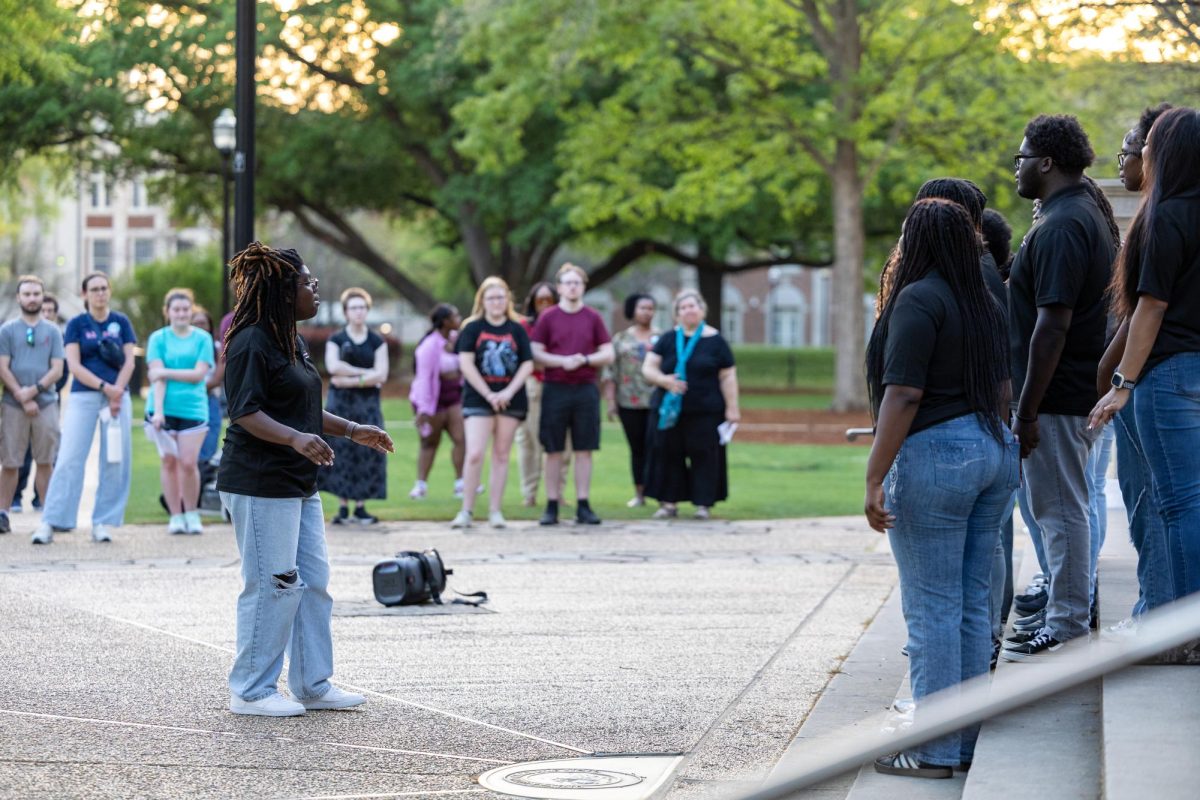Hooks’ experience is not unlike what many other college students will face in their lifetimes. Students are exposed to many different factors that can affect body image, whether these influences come from social media rankings about people’s looks or advertisements and Photoshopped images of models in media.
Katie Lightfoot, a freshman majoring in international relations and German, said that seeing girls’ bodies portrayed a certain way in the media impacted how she looked at herself when she was younger.
“The images we see in today’s media are telling us that there is a ‘right’ kind of body to have,” she said. “I always had muscular legs growing up, but through becoming more influenced with body standards through media, I began feeling somewhat insecure.”
The potential harm these photos in media popularizing the “perfect” body type through retouching can bring has not been lost on researchers of body image or professionals in media.
Researchers like Kim Bissell, a University of Alabama journalism professor, have studied the use of photo retouching in media and its results on adolescents and college students, and have found that eating disorders are prevalent and children are learning to dislike their bodies. Bissell, who is the director of the Institute for Communication & Information Research at The University of Alabama, studied body image distortion as well as media and health literacy. She has been at the University since 2000 and works as the Associate Dean for Research in the College of Communication & Information Sciences.
Her experience in journalism led to her discovering how a lack of understanding media can lead consumers to negative body image. Specifically, she expressed how retouched and idealized pictures in the media can influence those with less awareness of the media.
“[Consumers] are going look to the images and want to emulate what they see, they’re going to want to say ‘how can I look like that?’ I don’t want to throw the media under the bus for this because they aren’t the only ones… [but] we’re bombarded with these images of the ‘perfect’ body,” she said.
Bissell also found that the promotion of the “ideal” image has resulted in negative body image among children. She conducted studies with kids at local elementary schools and found examples of negative attitudes towards body image many would not expect from such young people. For college students dealing with body image issues, this means they might have begun their struggle at a younger age than their parents or doctors knew about.
“To know that young kids are believing that they aren’t good enough, that they aren’t accepted… It’s absolutely heartbreaking to watch an overweight child look at a picture of another overweight child and say they don’t think people would be his friend,” Bissell said.
Lightfoot said many college students have resorted to harmful behaviors as a result of the negative body image that can come from aiming to look like the retouched images in media.
“When all people are built differently, this creates an unreachable bar that many feel they must strive to maintain,” she said.
Chris Roberts, associate professor at The University of Alabama and co-author of Doing Ethics in Media: Theories and Practical Applications, expanded by calling such unattainable beauty “a false vision.” Although his area of interest is more media ethics and not body image in general, he considers the two to be closely related.
“It’s always to make money, isn’t it?” he said. What Roberts is referring to is the actions by some media and advertising companies to promote insecurities that can supposedly be solved by buying a product.
He explained how he thought it is unethical to promote a body image that is unattainable and the role finances can play in magazines, celebrity news and other media.
“Anytime you’re selling people a reality that does not and can not exist is no different from telling them a lie,” Roberts said.
This false reality being advertised to sell products has resulted in college students believing the models’ bodies in the images are attainable, despite the fact that the models may not even have the same body without Photoshop.
In her research paper “Exploring the influence of mediated beauty: Competitive female athletes’ perceptions of ideal beauty in athletes and other women,” Bissell claimed these negative thoughts towards one’s body can occur from exposure to media influences that set a precedent for the “ideal” body type. She said that while consumers may know a picture has been retouched, it still portrays a fantasy many believe they should want over reality.
“I think there is still a high value based on perfection. This is especially true with advertisements, because they are trying to sell you an idea, a brand,” Bissell said. “When you are doing this, you want to put your best foot forward, so if there are any imperfections the thought is ‘we need to correct them.’”
Rachel Wilburn, a junior majoring in journalism and and photographer at The University of Alabama who has shot for The American Heart Association, weddings and various events, said that she tries to avoid retouching images to extreme levels in an effort to maintain the original beauty of the subject.
“I think excessively photoshopping images can contribute to negative body image… I mean, how many times have I, even as a photographer who knows the practice, looked at a magazine image and wished I could have certain features the model has,” she said.
In her research of body image distortion and its causes, Bissell also examined the results that come from having a negative body image. Bissell came to the conclusion that these influences can lead people to think and act in harmful ways.
“What you have is kids and adults doing dangerous things to themselves, all because they’re striving for something that isn’t real,” she said. “The rates that we hear regarding anorexia and bulimia are exponentially lower than what they actually are, and the result is that it is only the extreme cases we hear about. This is because we don’t hear from individuals who are close to being diagnosed with an eating disorder.”
While Bissell and others researchers have studied the notion that retouched images have had a negative effect on body image, there has not been a quick solution to counteract this problem. Both Roberts and Bissell suggest steps that could be taken to address the issue.
Roberts referred to the pledge taken by Seventeen magazine in 2012 to avoid Photoshopping models’ faces and bodies. This pledge started online and garnered over 80,000 signatures in support of a Photoshop ban. He also suggested the idea of media letting consumers know when a picture has been altered to make someone appear more “ideal.”
“At the very least, if you’re going to mess around with Photoshop and mess with reality, you need to make sure readers know it’s not reality if there’s any chance they might think otherwise,” he said.









